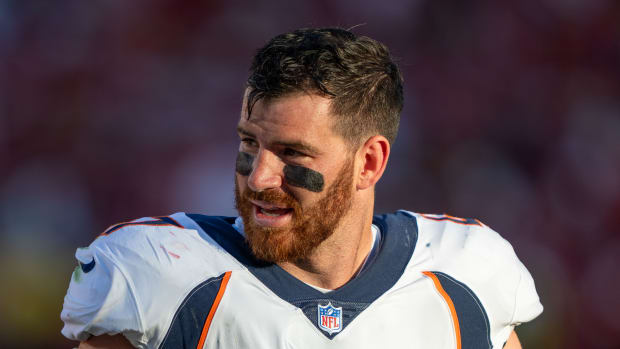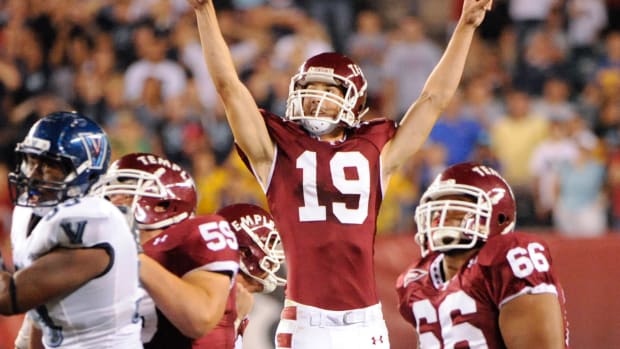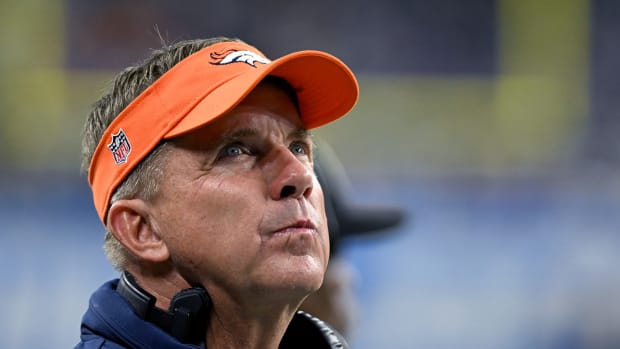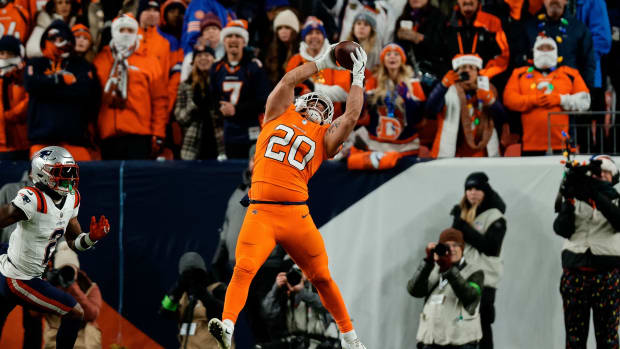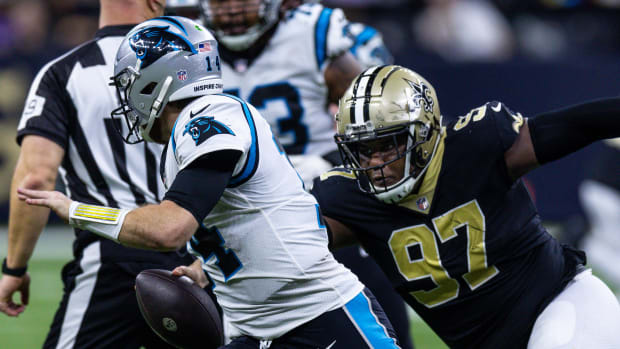Three Lessons Broncos can Learn from Niners' Monumental Turnaround
The Denver Broncos are not currently a very good football team. From their 3-8 record to their 20-3 loss against the Buffalo Bills on Sunday, the 2019 season has been one to forget.
This wouldn’t be such an issue if the Broncos’ struggles were an isolated incident, but considering the team has gone 23-36 since Peyton Manning and the peak of that all-time Super Bowl 50 defense rode off into the sunset, the team has struggled not only to remain competitive, but climb out of the cellar of the NFL.
Broncos Country is not used to being stuck at this level of ineptitude. While this team is only a few seasons removed from winning the Lombardi Trophy, since that achievement, things have not gone according to plan.
Fans have seen three different head coaches over that span, a number of different schemes, a revolving door of quarterbacks, and a continually leaky offensive line. The Broncos have done one thing really well since 2015 and that is being maddeningly inconsistent and underwhelming.
Perhaps many fans have been spoiled by success. Going from 16 years with John Elway at the quarterback position, to the ‘solid’ post-'90s seasons of Mike Shanahan, to a four-year run of dominance with Manning, this team has not had a stint of play this poor since around the Summer of Love in 1967.
There are no guarantees in the NFL that a great team will stay great. Empires rise and fall in history all the time, and the landscape of the NFL is no different.
While this may bring some solace that, eventually, hopefully, maybe one day, the New England Patriots’ dynasty will crumble, it also meant that after all those successful years as one of the elite teams in the AFC, the Broncos were due for some regression to the mean.
No team is above regression, but that doesn’t have to spell doom and gloom forever. The San Francisco 49er are a perfect example of how a once-proud franchise can help climb out of the depths of impotence. Not producing a winning season since 2013, the Niners have struggled immensely over the last few seasons. Even after hiring a young hotshot offensive head coach in Kyle Shanahan, the team continued to struggle.
Going 6-10 and 4-12 in his first two seasons as head coach, there was undoubtedly a high number of those questioning whether Shanahan was the answer for the Nieners as head coach entering the 2019 season. Starting off 10-1 and blowing the doors off against the NFC-contending Green Bay Packers to the tune of a 37-8 drubbing on Sunday night, the Niners are one of the best turnaround stories of this NFL Season.
How have the Niners managed to turn things around so quickly and as profoundly as they have? Are there any lessons that John Elway and the Broncos can take from John Lynch and their friends over by the Bay? Let's examine.
1. Patience in Coaching Staff & Scheme Continuity
One thing that the Niners have done quite well that has evaded Elway and the Broncos during his front-office tuner is show patience. With constant turnover, not only from leadership positions within the coaching staff and locker room but in scheme, the Broncos have done little to promote continuity since Manning left the organization.
This isn’t too much of a surprise given Elway’s very high standard and desire to 'compete' each and every season, but there is something to be said for patience and forward-thinking vision. Shanahan lost 22 games in his first two seasons in San Francisco but kept his job.
Would the same be said if he had done so in Denver? Impossible to say but evidence would suggest his seat would be on fire in the least.
Not only does retaining your coach and giving them the means to succeed matter, but it also matters in team building. From personnel acquisition in the NFL Draft and free agency to player development, changing scheme year-after-year makes it nearly impossible to build a contender in the NFL.
The types of players a team needs to run a zone-heavy running game and a Cover 3 defense differs from that of a team running a more power-heavy ground attack, shotgun passing offense and playing a blitz-heavy press-man defense. These different schemes require players with different specialties that make them better fits in one scheme than another.
Certainly there is some crossover in skill-set, but if putting players in a position to succeed is half the battle, the other half is getting players that can do what your coach and scheme demand ideally.
The call for patience and foresight can also be too conservative at times. As the years of mediocrity that plagued the Cincinnati Bengals under head coach Marvin Lewis revealed, there is such a thing as needing to take the next step or being stuck in limbo, but when there is no stability nor continuity and no job security, how can a team truly settle, build an identity, and grow?
2. Adequate QB Play
Perhaps it's beating a dead horse at this point, but in the NFL, it is next-to-impossible to contend, let alone win a football game, if a team doesn’t have an adequate level quarterback. Of course, having an absolute franchise arm like Russell Wilson or Aaron Rodgers is amazing to have in terms of building a team that has a chance to win-it-all each year, but we are talking adequate baseline level starting quarterback play at this point.
In the years since Manning, no other position has embodied the ‘World of Suck’ quite like that of the quarterback position. We're talking about the likes of Trevor Siemian, Paxton Lynch, Brock Osweiler, Mark Sanchez, Case Keenum, Joe Flacco, Brandon Allen; a steaming heap of 'no thanks'.
Some will place more blame on the front office, the coaching staff, and everyone’s favorite, the offensive line, but the fact of the matter is, without the quarterback position set, it doesn’t really matter what else the team has in place — they will struggle.
Again, the Niners are a great example in regards to just how important baseline-level quarterback play can make or break a team. Since first starting at quarterback under Shanahan, Jimmy Garoppolo has led the Niners to an outstanding 16-3 record as the starter.
In games without Garoppolo starting, including prior to acquiring him via trade and starting him, as well as the games lost due to injury last season, the Niners are 4-20. Of course, the Niners have added talent around their quarterback to help take this team to the next level, and maybe even Garoppolo is closer to ‘just a solid quarterback’ than one on his way to Canton, but goodness, what a stark difference having at least an adequate starting quarterback can make for a team and franchise.
While many Broncos fans are pinning their hopes on Drew Lock, and perhaps not wrongfully so, given that Denver spent a high second-round pick on him, he still is an unknown quantity and it remains to be seen whether he can be the answer at quarterback for this team or not.
Either way, the Broncos need to continue looking for an answer because the train doesn’t leave the station of ineptitude until the quarterback position is set. Even just a solid one can change the entire dynamic of a team and help cover up deficiencies elsewhere on the roster.
3. Hitting on the Trenches Early & Often
One thing that NFL Network analyst Daniel Jeremiah stated that has stuck out in regards to the Niners and their philosophy is how the team built their ‘house’ on a rock. Unlike some teams that are taking the likes of wide receivers, running backs, and safeties in the top-10 year after year, since the 2015 draft, the Niners have poured one first-round resource after another into the trenches.
In 2015, San Francisco selected DL Arik Armstead, in 2016 it was DL DeForest Buckner and OG Joshua Garnett, in 2017 DL Solomon Thomas and LB Reuben Foster, in 2018 OT Mike McGlinchey, and this past draft, the team chose likely Defensive Rookie of the Year Nick Bosa.
While Garnett and Foster did not pan out, and many have criticized the team for continually selecting the same position (specifically the defensive line), those picks have established the core of this team in the present and the future.
Given the talent level the Niners have on their defensive front, they are nearly impossible to block one-on-one. Instead, teams must allocate players to help slow down their dominating pass rushers, limiting their own offense's ability to protect their quarterback.
This, in turn, allows the Niners' back seven to play better because their defensive front is dictating action each and every snap and winning regularly in the trenches. As the 2015 Broncos have shown, having a team that can disrupt and win at the point of attack, especially in the passing game, is the greatest disruptor of elite quarterbacks.
When the opportunity presented itself, the Niners did also attack the offensive trenches as well. While Garnett didn’t really work out, selecting McGlinchey to be the bookend tackle opposite of long-time veteran Joe Staley, along with savvy moves in free agency, have helped solidify the unit as a whole.
Of course, San Francisco's years in this scheme, a bevy of run weapons, and perhaps the best tight end in football in George Kittle, all help the offensive trenches, but the Niners' commitment to adding trench football difference-makers, and striving to be the most physically dominant team each and every week, is worth noting and commending.
The Takeaway
The Broncos are a proud franchise, but that history alone has not kept them out from the current purgatory they have found themselves in over the last few seasons. The Niners did have a nice blip of relevance from 2011-13 in the NFC, but for the most part, they too have been a franchise with a proud history that fell into a pit of continual despair and ineptitude.
Things have changed for the Niners, though, as they appear to be a true Super Bowl contender in the NFC and a team set to contend for the next few seasons.
Despite the Niners' struggles in the standings under Kyle Shanahan prior to 2019, the organization stuck with him, his scheme, and his staff, and preached continuity and growth. Their patience and vision have been rewarded as Shanahan and his scheme is now the ‘saveur du jour’ in NFL coaching circles.
On top of continuity, the Niners have also proven the importance of, in the least, having baseline-level quarterbacking and what it can do for an NFL team. Without an all-time defense continually gripping victory from the jaws of defeat, such as the 2015 Broncos, teams cannot win with such putrid quarterback play as Denver has fielded.
The Broncos need to find their QB, an improved offensive line, weapons, defense, coaching, or they will be stuck spinning their wheels. Finally, in the era of fantasy football and throwing it all across the yard, the Niners' perseverance in using high resources on trench players and winning with talent at the point of attack has helped establish an identity that can go in and compete against anyone, anytime, anywhere.
Elway and Lynch are GM buddies, so hopefully, the two can share a steak or two over the offseason and the Broncos can learn something about how the Niners have created such a quick and emphatic turnaround and steal some of that secret sauce for themselves.
Follow Nick on Twitter @NickKendellMHH and @MileHighHuddle.


